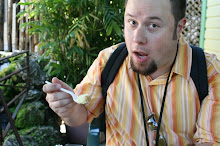Two men are riding in a train compartment together. One man says, “What’s that package up there in the baggage rack?” And the other answers, “Oh, that’s the MacGuffin.” The first one asks, “What’s a MacGuffin?” ”Well,” the other man says, “it’s an apparatus for trapping lions in the Scottish Highlands.” The first man says, “But there are no lions in the Scottish Highlands,” and the other one answers, “Well then, that’s no MacGuffin!”
In short, the MacGuffin is a literary device. Unlike a red herring (like Communism, for example), the MacGuffin does not aim to mislead but instead it serves to drive the plot of a story while being unimportant of itself. The MacGuffin puts a story into action, like Janet Leigh stealing forty grand, then leaves the story faster than you can say "Oh God, Mother!"
Hitchcock was a master of the MacGuffin, like Harry in 'The Trouble with Harry', or the original theatre scene in 'The 39 Steps', and the unnamed government secrets in 'North by Northwest'. Also widely regarded as MacGuffins are the briefcase in 'Pulp Fiction', the Maltese Falcon in 'The Maltese Falcon', the egg salad recipe in 'What's Up, Tiger Lily?', and my favorite, the gold in 'The Good, The Bad and The Ugly'.
 |
| someone has too much time on their hands... |




3 comments:
Awesome - I learned something here today, Elliott. AND now I want a McMuffin.
This makes me reconsider why my parents called me MacGuffin when I was a kid. I just thought it was a term of endearment.
That damn Pulp Fiction briefcase!!! :-)
Post a Comment